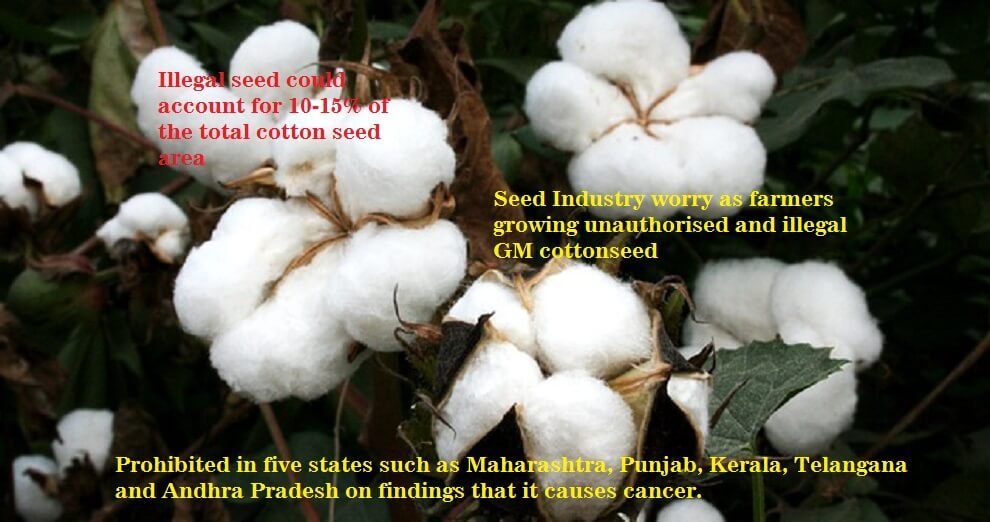Worries about farmers growing unauthorised and illegal genetically modified (GM) cottonseed known as Bollgard-III or ‘Bt-3′ are haunting the seed industry and farmers’ leaders as cottonseed units set up for the Kharif season to begin in month of June.
People in the industry who are familiar with the situation said that illegal seed could account for 10-15% of the total cotton seed area in the country in the next kharif period. “It was a little lower previous year, but on good demand, the market could swarm with huge volumes,” said, the senior executive of the seed company, on condition of anonymity.
‘Bt-3’ or BG-III, a third generation biotechnological product that helps protect the cotton crop from the threat of weeds, has not been authorised by the regulator Genetic Appraisal Engineering Committee (GEAC).
Use prohibited in five states
Technology has given the plant the ability to resist herbicide spraying. When sprayed, the herbicide (a glyphosate that is prohibited in five states such as Maharashtra, Punjab, Kerala, Telangana and Andhra Pradesh on findings that it causes cancer) it keeps killing the weed but not the plant that has built-in protection.
The seed business sector, which is booming in the coming season, deplores the trend in the sale and buy of illegal seeds.
Also Read: Paddy purchasing increased by 16% this Kharif to 638,57 lakh tons
‘Yes, it’s growing. It’s not a good thing for oganized players like us. We made a number of representations to the Central Government. But there is still no progress in stopping the expansion of illegal seeds,’ told reporters, M Prabharaka Rao, Chairman and Managing Director (CMD) of Nuziveedu Seeds Limited.
‘Gujarat and Gadwal in state of Telangana are the hotbeds of illegal production of Bt cotton seeds. In regions, h ere and there, they grow it in smaller pieces of land. It’s very difficult to detect them,’ the Cotton Seed Company executive told.
Illegal seed merchants use clever methods to avoid any kind of scrutiny. They pack the seed in small bags to avoid the need for attention while transporting. They’re not transporting seed bags in large trucks.
‘Why, in packing, they even use popular brands of top seed players to mislead farmers. Unsuspecting farmers think they’re buying real seeds. We’re losing a lot here,’ he replied.
‘Why, in packing, they even use popular brands of top seed players to misguide farmers. Unsuspecting farmers think they’re buying real seeds. We’re losing a lot here,’ he says. The seed business sector that sold 4.5 crore packets (450 gm each) last year has an wearhouse inventory of about 1.3 crore packets carried over from last year.
Damage to rain
‘There may be a shortfall of some promising new hybrids due to rainfall damage in October, 2020. Overall, despite losses in seed production due to rainfall, there’ll be enough stocks for the upcoming season,’ said Prabhakara Rao, who is also the President of the National Seeds Association of India (NSAI).
Telangana Rythu Sangham predicts that illegal Bt-3 seeds could cover an area of 7-8 lakh acres in Telangana in the coming season compared to about 5 lakh acres last year. ‘The police seized 20,000 quintals of this seed last year and slapped about 210 cases. However the real guilty parties are not being caught,’ said S Malla Reddy of Telangana Rythu Sangham.
Also Read: Apollo Hospitals to work with millets growing women farmers for hospitals diet
Farmers in states like Telangana, Andhra Pradesh and Maharashtra claimed that it lowered the cost of cultivation, in particular labour costs for weed removal. They are also demanding that they have access to the latest crop emerging technologies.
The seed industry and farmers are worried that no new genetically modified (GM) seeds have been approved by the GEAC since 2006. The problem arose after the Supreme Court made the announcement a temporary ban on the commercial release of Bt Brinjal in 2009. Although the moratorium expired in 2019, no new varieties have yet been approved by GEAC.
Field trials of GM crops must be conducted prior to commercial release. For this purpose, the Central government has asked the seed companies to obtain the approval of the Government from respective State. But this is proving to be a difficult issue, particularly with States that could go to the polls in two years’ time.
Also Read: Farmers Develop very own Soya and Onion seeds makes industry worry















Add Comment